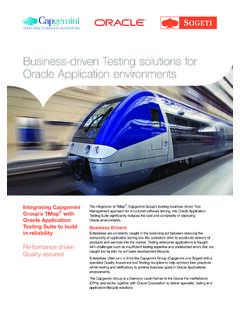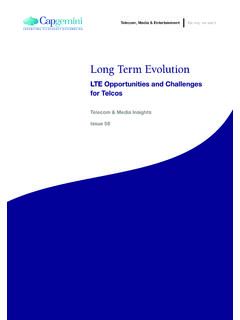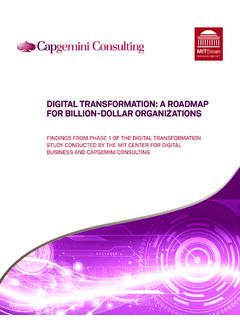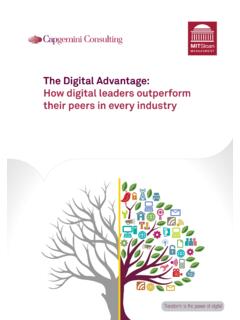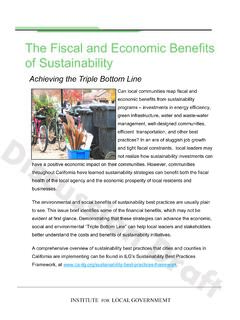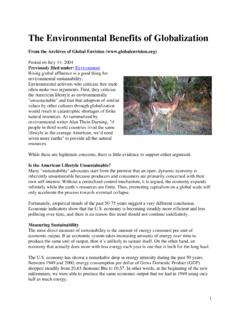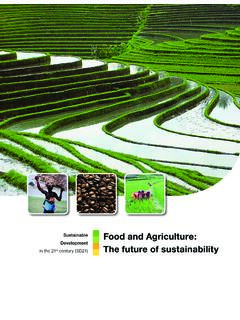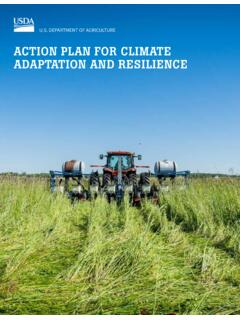Transcription of The Automotive Industry in the Era of Sustainability
1 The AutomotiveIndustry in the Eraof SustainabilityThe Automotive Industry in the Era of Sustainability2 Executive summaryWith growing concerns of climate change and environmental degradation, Sustainability has become a strategic priority for Automotive organizations. Governments, consumers and investors are now pushing Automotive organizations to change their ways of working, culture and products. This will have far reaching implications for the Industry , that while making substantial progress still requires to step up its Sustainability research tried to gauge how the Automotive Industry is responding to the challenge. This includes scrutinizing their progress and initiatives with the collective knowledge of more than 300 Sustainability experts and regulators.
2 Our key findings are: Sustainability is a strategic issue for the Automotive Industry and key to organization purpose The implementation of Sustainability initiatives is fragmented and lacking on many fronts: Some areas such as sustainable R&D and sustainable manufacturing which are closer to the core competency of the Industry receive greater attention. But there is not a consistent focus on Sustainability initiatives across the value chain. For instance, sustainable sales, marketing, aftersales and mobility services and vehicle usage are pursued by only a minority. Most organizations do not have a central governance body for Sustainability and only half of the Automotive Industry have Sustainability targets for key executives.
3 An estimated USD 50 billion is required over the next five years to meet their Sustainability targets in addition to the current investment in electric vehicles, autonomous vehicles and digital mobility services. Two critical areas will drive maximum Sustainability impact for the Automotive Industry : Ensuring that electric vehicles are truly sustainable. Based on the grid which charges EVs, in the 27 EU countries and the UK, for example, the shift to electric vehicles would cut the overall lifetime greenhouse (GHG) footprint by about 37% for passenger vehicles while reducing the operating footprint by 75%, when powered by renewable sources. Incorporating circular economy practices across the Automotive value chain. Circular economy has the potential to offer big economic benefits and make EVs more sustainable.
4 However, currently, only 32% of the Automotive organizations supply chain contributes to the circular economy. Based on learnings from Sustainability leaders (less than 10% of organizations we analysed), we highlight key best practices: Demonstrate tangible progress on Sustainability by adopting standardized public disclosures. Pursue Sustainability as an organization-wide mission Make business executives accountable for Sustainability and invest in robust governance Envision and spread Sustainability initiatives across the Automotive value chain Use technology to improve Sustainability of operations Strengthen alliances and partnerships for greater impact 3 The Automotive Industry in the Era of Sustainability4 IntroductionFor the past couple of decades, the Automotive Industry has been under considerable pressure from governments and society to pursue a more sustainable model of growth.
5 This reflects the significant impact it has on the environment: Transportation accounted for a quarter of the world s global CO2 emissions in 2016, with road transportation alone accounting for 18%.1 The degradation of natural ecosystems. China mines most of the natural graphite used in electric vehicles. Increased demand along with lax environmental regulations have led to crop failures, soil pollution, water contamination and large-scale environmental Non-biodegradable waste from end-of-life usage and manufacturing waste have resulted in a considerable contribution to landfills, land toxification, and water pollution. Between January and June 2017 alone, the US, Europe, and Japan exported million tons of plastic waste to developing countries, mostly in A substantial part of this was from end-of-life Production of vehicles takes considerable energy, water, and resources, increasing the carbon footprint.
6 The Automotive Industry uses billion litres of water and produces 1 million tons of CO2 from UK manufacturing of cars and components Industry , in response, has been working on addressing many of these concerns. For instance, between 2000 and 2015, EU Automotive companies were ahead of the carbon footprint reduction targets set by regulators achieving CO2 emissions of close to 120 g/km against a target of 130 g/km (see Figure 1).6 A similar trend could be seen in the 1: New passenger fleet CO2 emission, EU (g/km, NEDC)18016014012010080200020052010201520 202025 Rate needed to meet2015 target; 2007-2015 Historical rate withfirst 2007-2015 Historical rate withsecond 2015-2018 Historical dataBusiness as 2000-20072015: 130 g/km2021: 95 g/kmTrendsTargetsSource: International Council on Clean Transport, European Vehicle Market Statistics 2019/2020 edition, December Automotive Industry in the Era of Sustainability6 However, after 2015, carbon emissions started to rise, led by growing sales of SUVs.
7 At the same time, growing environmental concerns have meant increased pressure from a variety of stakeholder groups: Regulators. Globally, regulators are imposing more stringent and comprehensive measures to reduce the environmental impact of A growing number of cities are restricting the entry of vehicles with high emissions. Public-interest groups. Globally, there is rising public awareness and concern about the harmful impact of the human activities on the This, combined with the transport sector s high share of total emissions, has meant the Industry is under intense pressure and scrutiny from environmental and public-interest groups, and society at large, to take active measures to curb emissions. This is reflective of consumer demand for electric vehicles.
8 It has grown phenomenally 63% in 2018 to 5 million stock units. It is expected by 2030, electric vehicles will have global sales of 23 million units (excluding two/three wheelers) and 130 million electric vehicles on the Investors and financial institutions. Investment firms are pushing for Sustainability and climate change as investment criteria to evaluate target companies. Large players in capital markets such as BlackRock, the world s largest asset manager are making a major strategic shift to environmental Financial regulators, insurers, and central banks are also considering Sustainability as a critical part of their risk portfolio and regulation. To understand where the Automotive Industry stands today in terms of its Sustainability efforts, we launched a comprehensive research program, surveying 500 large Automotive organizations as well as 300 experts, including regulators, academics, and non-governmental organizations working in the field of Sustainability .
9 More details on the research methodology are at the end of the report. Our research looks to answer the following questions: What are Automotive original equipment manufacturers (OEMs) and their suppliers doing to ensure that the entire Automotive value chain is sustainable from responsible mining of metals to sustainable waste disposal? How mature are Automotive organizations in implementing their Sustainability initiatives? How can the Automotive Industry ensure that major Sustainability drivers such as electric vehicles and supporting a circular economy deliver on their promise? What can Automotive organizations learn from leading players who are at the forefront of Sustainability ?3002902802702602502402302 20210200020052010201520202025CO (g/km)Business as usual: (2000-2007)Historical rate: (2007-2017)Source: Environmental Protection Agency, The 2018 Automotive Trends Report, March 2: New passenger fleet CO2 emissions, US (g/km, Real world EPA s GHG model)7 What do we mean by Sustainability in the Automotive Industry ?
10 Sustainability in the Automotive Industry involves a comprehensive view of planet- and human-friendly operations, processes, products, and services. As Figure 3 shows, we identified 14 elements that the Industry is pursuing in the field of Sustainability . These range from Sustainable R&D and product development to Fair labour policy and span the Automotive value chain, from R&D to Mobility Services. R&D and engineering1. Sustainable R&D and product development2. Product sustainabilitySupply chain3. Sustainable supply chain4. Environmentally responsible sourcing of metals, 5. Due diligence of all material and product procurement Manufacturing & operations6. Sustainable manufacturing7. Recycling of waste and easy returns for end-of-life disposal 8.

